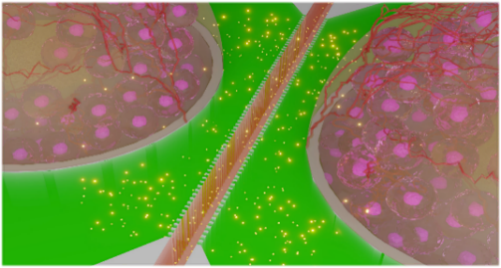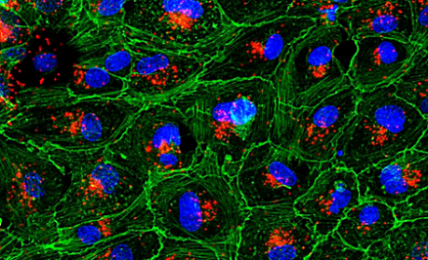Tumour-on-a-chip devices for assessment of nanomedicines
RESEARCH PROGRAMME
P3: Nanotechnology for healthcare
PhD PROJECT DESCRIPTION
Over the past few decades, numerous nanoparticle (NP) based therapies have been developed for the treatment of cancer. Many of these nanomedicines have shown high therapeutic efficacy at in vitro studies but they have failed later at in vivo tests. This is because the effectiveness of the NP-based delivery systems depends primarily on the ability of the NPs to reach the target tissue and this aspect is not incorporated currently within in vitro assays.
In the case of solid tumours, the main physiological barrier that nanomedicines have to overcome results from the abnormal tumour microenvironment. Due to the fast tumour growth, large compressive and shear stresses are generated within the tumour and the extracellular surroundings which, in turn, prevents the extravasation of nanomedicines by convection limiting drug delivery to passive diffusion.
To study the nanomedicine delivery transport process more realistically, this tumour scenario will be recreated in vitro by developing tumour-on-a-chip (ToC) devices. This device will incorporate microfluidic technologies integrating cellular and extracellular components of the tumour microenvironment. The devices will be specifically engineered to recreate the primary physiological barriers encountered during the delivery of nanomedicines within a tumour. These obstacles include the vascular endothelial barrier and the densely packed extracellular matrix.
The study will characterize the dynamic transport process of model NPs across the endothelial barrier under simulated flow and overpressure conditions common in solid tumour microenvironments.
Transendothelial electrical resistance (TEER) sensors will be incorporated into the device to evaluate the formation of tight endothelial junctions as well as the integrity of the endothelial barrier. The sensors will be also employed to perform permeability studies of NPs across the semipermeable endothelial barrier and matrix compartments.
The ToC microfluidic devices may be useful as platforms for rapid screening of NP-based cancer therapies and better prediction of effective nanomedicine designs. More predictive in vitro assays would improve nanomedicine designs, reducing reliance on animal testing.
The doctoral researcher will receive international and cross-sectoral training and will be able to complete a 3-6-month-long secondment offered at one of our partner organisations relevant to the research project and the researcher´s career.


APPLICANT’S REQUIREMENTS
We are looking for a highly motivated doctoral candidate for a research position in tumour-on-chip microfluidics devices.
The applicant would need to have a Master’s degree in fields related to biophysics, biomedical engineering or bio-engineering.
The applicant should possess some experience in microfabrication technologies, particularly using polymers, microfluidics, cell culture, immunocytochemistry, fluorescence microscopy, image analysis and statistics.
Experience in computer-based modelling and simulation, CAD software for 2D & 3D design, SLA or 2 PP photopolymerization will be considered a plus.
RESEARCH GROUP DESCRIPTION
This work will be performed at the Nano Functional Surfaces group (NFS) http://nanociencia.imdea.org/nanostructured-functional-surfaces-program/group-home
This group leverages nanofabrication technologies, particularly on soft materials to develop nanostructured functional surfaces or devices.
The special competencies of the program include surface patterning techniques such as nano-imprint lithography, hot embossing, soft lithography and molecular patterning.
Presently the program is active on:
a) Nano-engineering functional surfaces for medical applications https://onlinelibrary.wiley.com/doi/full/10.1002/admi.202200608
b) Organ-on-a-chip devices https://onlinelibrary.wiley.com/doi/full/10.1002/anbr.202200164
c) Multifunctional bioinspired surfaces https://doi.org/10.1016/j.apsusc.2022.152653
RESEARCH SUPERVISOR
Dr Isabel Rodríguez Fernández
i.rodriguez@imdea.org
Research Group website: http://nanociencia.imdea.org/nanostructured-functional-surfaces-program/group-home
